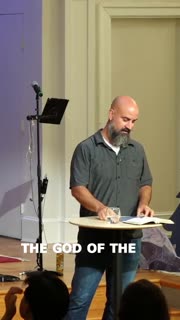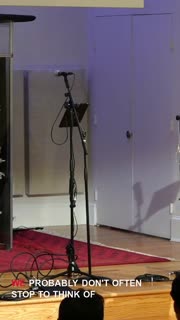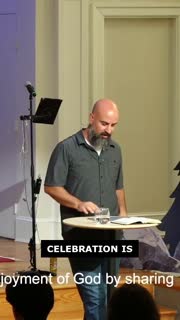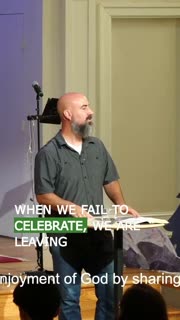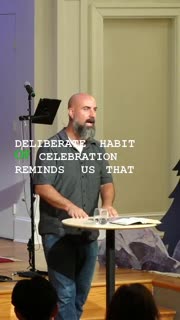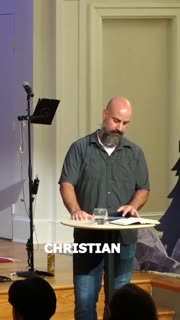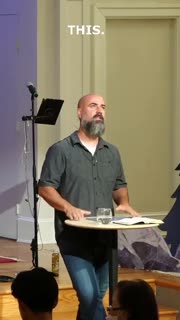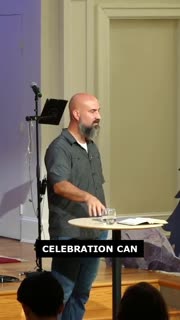Embracing Joy: The Christian Call to Celebration
Devotional
Sermon Summary
Bible Study Guide
Sermon Clips
1. "The God of the Bible wants us to celebrate. hope you caught that in the teaching text. Look again with me at it. It's Deuteronomy 14 and following. It's talking about the annual harvest celebration. Now, when the Lord your God blesses you with a good harvest, it's a when, it might be too far to carry. A tenth of your year's income. The minivan might not make it. So liquidate a tenth of your harvest and travel to the temple. And now here comes the surprise. When you get there, you may use the money to buy any kind of food that you want. Cattle, sheep, goats, wine, or other alcoholic drink. Then feast in the presence of the Lord your God and celebrate with all your household." [02:57] (52 seconds)
2. "We probably don't often stop to think of our lives as being comprised largely of an array of habituated actions. And nor do we often stop to think about how these habits that we have formed end up forming us. But from ancient philosophers like Plato through to modern writers like James Clear and his atomic habits, people who have thought deeply about how human beings change agree that habits have a formative role in our lives. And perhaps that's why we're here today. Perhaps no tradition is richer on this front than our own Christian tradition." [06:28] (45 seconds)
3. "We are joy vessels. We are joy vessels designed on purpose to be filled up and overflowing with the joy of God. Listen how David puts it at the end of Psalm 16. You make known to me the path of life. You will fill me with joy in your presence, with eternal pleasures at your right hand. You hear that? Pleasures everlasting in the right hand of God. This is how the ancient Christians envisioned life with God. This is the with God life that Jesus came demonstrating to us and that he offers for us. This is the life that you were built for, a life of joy." [10:08] (46 seconds)
4. "Christian celebration is the amplification of our enjoyment of God by sharing and marking his goodness together. All the parts of that sentence are important. It is possible to celebrate alone, but the practice, the Christian practice of celebration is traditionally done together. It's a communal habit. And it consists in sharing the goodness of God, whether that's feasting on the richness of the harvest, whether that's pouring around glasses of champagne at a graduation, whether that's delighting together in a performed piece of art or in a ritual. The goodness is shared, but it cannot terminate in the sharing of the good thing." [11:39] (47 seconds)
5. "When we fail to celebrate, we are leaving enjoyment of God's goodness on the table. This is the formation stage of the transformation parabola we've been talking about. In this series, we are designed on purpose by a good God for good things. That's what we read in our Christian story. We are built to experience and to enjoy God's goodness, and for that pleasure to be amplified by celebration. You all know what to expect next. We are designed for good, but along the way, we become malformed. Although we've been designed for joy, we are designed for good. We are designed for good, but along the way, we become malformed." [13:21] (44 seconds)
6. "The deliberate habit of celebration reminds us that while sin and evil are a regular part of our lives, we are not built for them and they will not last. We are built for joy. Dallas Willard puts it this way. This world is radically unsuited to the heart of the human person and the suffering and the terror of life will not be removed no matter how spiritual we become. It is because of this that a healthy faith before God cannot be built and maintained without heartfelt celebration of his greatness and goodness to us in the midst of our suffering and terror." [18:22] (33 seconds)
7. "Christian celebration done well points to a world that exists now that's breaking in now into our brokenness and that will outlast it. You know, the fancy theological word for this is sacramental. Christian celebration is sacramental. It has its feet on the ground of our reality, but it raises our gaze to a yet more enduring reality of the presence of the kingdom of God. And you are meant to taste that when the bread hits your lips and the wine slides across your tongue. You are meant to hear that when the applause and the singing breaks out as a person splashes up through the waters of the baptismal tub, blinking like a newborn." [19:57] (50 seconds)
8. "Some of you are really good at celebrating and sadly you've been made to feel like that has to be separate from your faith and that certainly there's no use for that gifting in the church. And that's not true and that's not the way it should be. Maybe you're an Enneagram 7 and you know how to get the marrow from life, but you feel like you got to shut down that part of your wiring when you're hanging out with your church family. But it isn't just wiring. That is gift. It's a gift that has been given to you for your enjoyment, but for the building up of the church family." [21:47] (38 seconds)
9. "Imagine this. Imagine that instead of being known for conspicuous consumption, you're known for being the least consumerist on the block and for being killjoys. Christians in Baltimore become known for being the least consumerist on the block and yet for throwing the greatest celebrations. That would be a change. There's one more crucial element of Christian celebration that I haven't touched on yet. Shortly after Pastor Sam and Esther moved from Princeton to Baltimore to help start St. Moe's, their son Ethan made a hundred days." [24:36] (38 seconds)
10. "Celebration can be the portal to belonging. Look back with me at our teaching text, particularly verse 29. Did you notice it? It's talking about the harvest. Give it to the Levites who will receive no allotment of the land among you, as well as to the foreigners living among you, the orphans and the widows in your town so that they can eat and be satisfied. Then the Lord your God will bless you in all your work. It's not just the owners of the harvest who get to celebrate God's goodness. God's people are meant to fold outsiders into the enjoyment of God's goodness through celebration. And that is the heart of the gospel." [26:18] (43 seconds)
Ask a question about this sermon
2. "We probably don't often stop to think of our lives as being comprised largely of an array of habituated actions. And nor do we often stop to think about how these habits that we have formed end up forming us. But from ancient philosophers like Plato through to modern writers like James Clear and his atomic habits, people who have thought deeply about how human beings change agree that habits have a formative role in our lives. And perhaps that's why we're here today. Perhaps no tradition is richer on this front than our own Christian tradition." [06:28] (45 seconds)
3. "We are joy vessels. We are joy vessels designed on purpose to be filled up and overflowing with the joy of God. Listen how David puts it at the end of Psalm 16. You make known to me the path of life. You will fill me with joy in your presence, with eternal pleasures at your right hand. You hear that? Pleasures everlasting in the right hand of God. This is how the ancient Christians envisioned life with God. This is the with God life that Jesus came demonstrating to us and that he offers for us. This is the life that you were built for, a life of joy." [10:08] (46 seconds)
4. "Christian celebration is the amplification of our enjoyment of God by sharing and marking his goodness together. All the parts of that sentence are important. It is possible to celebrate alone, but the practice, the Christian practice of celebration is traditionally done together. It's a communal habit. And it consists in sharing the goodness of God, whether that's feasting on the richness of the harvest, whether that's pouring around glasses of champagne at a graduation, whether that's delighting together in a performed piece of art or in a ritual. The goodness is shared, but it cannot terminate in the sharing of the good thing." [11:39] (47 seconds)
5. "When we fail to celebrate, we are leaving enjoyment of God's goodness on the table. This is the formation stage of the transformation parabola we've been talking about. In this series, we are designed on purpose by a good God for good things. That's what we read in our Christian story. We are built to experience and to enjoy God's goodness, and for that pleasure to be amplified by celebration. You all know what to expect next. We are designed for good, but along the way, we become malformed. Although we've been designed for joy, we are designed for good. We are designed for good, but along the way, we become malformed." [13:21] (44 seconds)
6. "The deliberate habit of celebration reminds us that while sin and evil are a regular part of our lives, we are not built for them and they will not last. We are built for joy. Dallas Willard puts it this way. This world is radically unsuited to the heart of the human person and the suffering and the terror of life will not be removed no matter how spiritual we become. It is because of this that a healthy faith before God cannot be built and maintained without heartfelt celebration of his greatness and goodness to us in the midst of our suffering and terror." [18:22] (33 seconds)
7. "Christian celebration done well points to a world that exists now that's breaking in now into our brokenness and that will outlast it. You know, the fancy theological word for this is sacramental. Christian celebration is sacramental. It has its feet on the ground of our reality, but it raises our gaze to a yet more enduring reality of the presence of the kingdom of God. And you are meant to taste that when the bread hits your lips and the wine slides across your tongue. You are meant to hear that when the applause and the singing breaks out as a person splashes up through the waters of the baptismal tub, blinking like a newborn." [19:57] (50 seconds)
8. "Some of you are really good at celebrating and sadly you've been made to feel like that has to be separate from your faith and that certainly there's no use for that gifting in the church. And that's not true and that's not the way it should be. Maybe you're an Enneagram 7 and you know how to get the marrow from life, but you feel like you got to shut down that part of your wiring when you're hanging out with your church family. But it isn't just wiring. That is gift. It's a gift that has been given to you for your enjoyment, but for the building up of the church family." [21:47] (38 seconds)
9. "Imagine this. Imagine that instead of being known for conspicuous consumption, you're known for being the least consumerist on the block and for being killjoys. Christians in Baltimore become known for being the least consumerist on the block and yet for throwing the greatest celebrations. That would be a change. There's one more crucial element of Christian celebration that I haven't touched on yet. Shortly after Pastor Sam and Esther moved from Princeton to Baltimore to help start St. Moe's, their son Ethan made a hundred days." [24:36] (38 seconds)
10. "Celebration can be the portal to belonging. Look back with me at our teaching text, particularly verse 29. Did you notice it? It's talking about the harvest. Give it to the Levites who will receive no allotment of the land among you, as well as to the foreigners living among you, the orphans and the widows in your town so that they can eat and be satisfied. Then the Lord your God will bless you in all your work. It's not just the owners of the harvest who get to celebrate God's goodness. God's people are meant to fold outsiders into the enjoyment of God's goodness through celebration. And that is the heart of the gospel." [26:18] (43 seconds)
